Ulysses Planners’ pushback nearly derails Ag. District add-on
Reporting and analysis by Robert Lynch; May 10, 2024
“Our opposition… is not an opposition to agriculture in the Town of Ulysses.”
Ulysses Town Planning Board Chair Pete Angie.
“To over-zone and overregulate farmland, I think, is to the detriment of our community.”
Tompkins County legislator Greg Mezey.
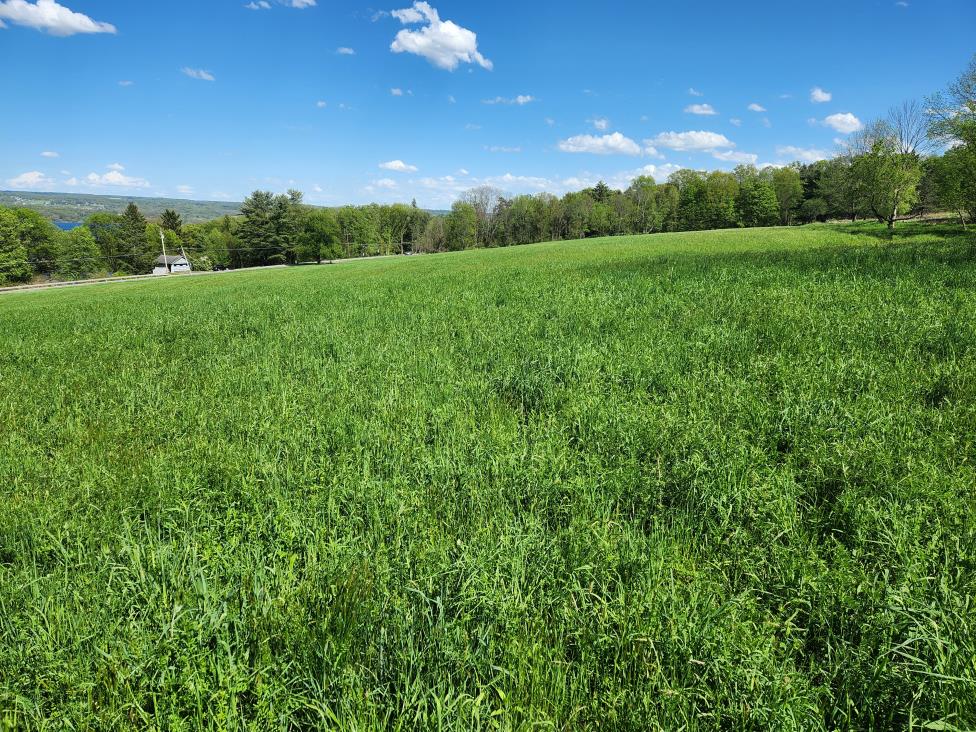
A once-in-every-eight-years renewal of an Agricultural District is the yawner of a news story reporters relegate to the bottom of the pile, should they even cover it at all. But this one proved different.
This one—the renewal of Agricultural District Number 2 on the west side of Tompkins County—plunged the Tompkins County Legislature into 35 minutes of back-and-forth debate Tuesday night. And though Ag District 2 covers tens of thousands of acres and spans five towns, including Enfield, the only point of contention Tuesday was just one little parcel; a miniscule 62-acre slice of hayfield and woods within a mile of Cayuga Lake, land its owner wanted to add to the District’s protective status, but almost couldn’t.
Yes, the fields lie within the Town of Ulysses, the tightly-zoned Town of Ulysses. And to the cynical observer, the answer is, “That figures.”
“Our opposition is not in opposition to the land being farmed,” Ulysses Planning Board Chair Pete Angie told the Legislature Tuesday, May 7th. “It’s not an opposition to agriculture in the Town of Ulysses,” he continued. “It’s really because we want to maintain the unique zoning that protects that area.”

Farmer William Holtkamp and the Tompkins County Agriculture and Farmland Protection Board got their way that night, but not with unanimity.
The County Legislature eventually approved the renewal of Agricultural District 2 with the adjustments the Farmland Board had recommended. The vote was nine-to-four. Before that, legislators rejected, five-to-eight, an amendment that would have struck Holtkamp’s 62 acres from those the Board had recommended be added to the District.
Ironically, Ulysses’ Anne Koreman, the legislator in whose district the controversial farmland lies, was excused from Tuesday’s meeting. In committee, Koreman had opposed the land’s inclusion.
The fields Holtkamp owns at 1618 Route 89 are open and wide, gently sloping, seemingly nothing more fragile than you’d find anywhere else in Tompkins County. But at the heart of the Ulysses Planning Board’s opposition is the fact that the property lies within the Town’s Conservation Zoning District, one in which buildings are limited to 3,500 square feet in size and 32 feet high. Were Holtkamp to build a barn or a silo, that could spell problems.
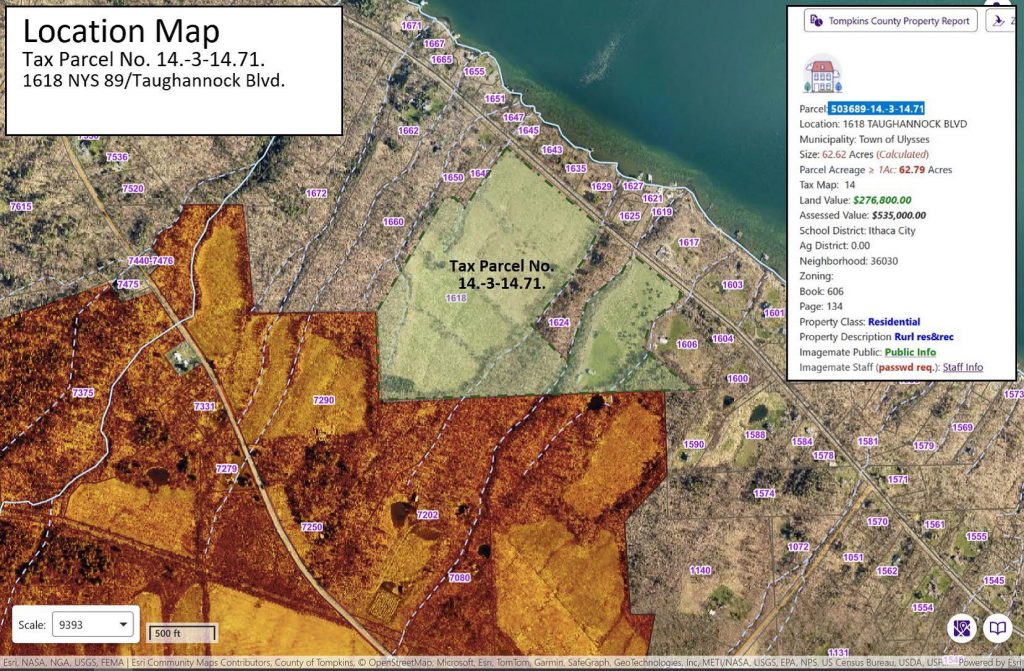
“This person has owned this property for a long time, he pays taxes on it, and he wants to continue to work (the land) the way it is,” Newfield-Enfield’s Randy Brown, the Legislature’s representative to the Farmland Protection Board, told legislators in defense of the land’s inclusion. “We felt that it was the right thing to do because the owner should have preference over the zoning that came after-the-fact.”
The Conservation Zone is quite obviously Ulysses’ attempt to protect its most cherished natural landmark, Taughannock Falls, and the parkland that surrounds it. But one cannot see the Falls from Holtkamp’s land, nor can one see his farm from the Falls itself. It’s doubtful whether a Falls visitor could hear the farmer’s tractor or his cow, providing he had one there, let alone smell the bovine’s manure.
Yet the doomsday denizen of dreadful industrial agriculture and the evils it might inflict crept into the Legislature’s discussion on whether to deny the 62 acres addition to the Agricultural District.
“Once you put it in the Ag District, it stays there for at least eight years,” Lansing’s Deborah Dawson, a former village Planning Board member, told fellow legislators. “If somebody comes along in two years and wants to put 1,000 head of cattle or 1,000 pigs on that property, which is a whole different kettle of fish from what you’ve got now, they can do that. And that’s what concerns me. And I suspect that’s what probably concerns the Planning Board.”
But for this particular land, hundreds of cows at a feeding trough or swine wallowing in mud seem unlikely, at least for the time being. Crystal Buck, Cornell Cooperative Extension’s Farmland Protection and Ag Marketing Educator, told the Legislature that right now the Holtkamp tract is locked into a multi-year “Conservation Reserve Enhancement Program.” It means the land can be harvested for hay, but farmed for little else over much of the next decade.
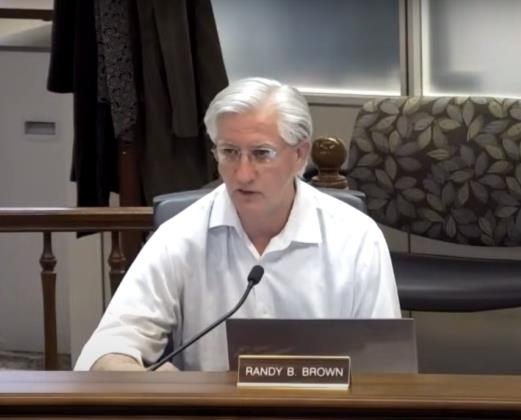
“He wants to protect the farmland, that’s his goal,” Buck said of the farmer’s intent.
Assessment Department records indicate that of the 62 acres, approximately 41 are tillable, 19 acres assigned to woodland. This year the land was taxably assessed at $600,000. Presumably, an Ag Exemption applies.
Nothing else within Ag District Number 2’s four corners registered a whimper of concern at the County Legislature that night. District 2 encompasses some 67,000 acres within Enfield, Newfield, Ulysses, Danby and the Town of Ithaca. As recommended by the Agriculture and Farmland Protection Board, this year’s revisions added 1,229 acres to the district and subtracted 466.
But what transpired at the Legislature Tuesday night—and what occurred earlier in discussions within Ulysses—provides a snapshot at the larger picture. It’s the tug-of-war between anti-regulatory rural libertarian zealots and the anxiety-prone residents who encroach from elsewhere. It’s a conflict not confined to Tompkins County’s northwestern-most town. It manifests itself in the Town of Caroline’s controversial march to embrace rural zoning, and also in the Town of Enfield’s latest initiative to rewrite its Comprehensive Plan.
“The nature of the Town is changing,” Supervisor Stephanie Redmond advised the Enfield Town Board she presides over Wednesday, just one night after the County Legislature took its vote on Ag District 2.
Prodded by both Redmond’s and Enfield Councilperson Jude Lemke’s concerns, the Town Board Wednesday directed it solicit membership in a citizens committee, of open-ended number, to consider Comprehensive Plan revisions. The current Plan was adopted only four years ago. It stresses the need to preserve Enfield’s “rural character.” Dan Walker, Chair of the Enfield Planning Board, said earlier this month that in his opinion, Enfield’s Comprehensive Plan only needs minor tweaks, not a full rewrite.
But back to Ag District 2: “The local jurisdictions are best situated to understand what the local needs are in their communities, what the zoning should look like, what the local resources are,” legislator Dawson apprised her colleagues before their vote. Dawson cautioned that the Farmland Protection Board can make recommendations “from a pretty narrow focus.”
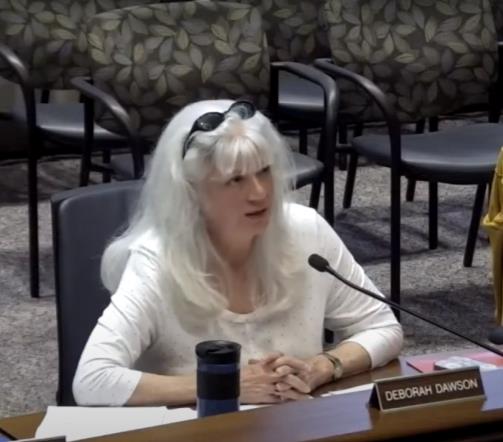
But do six Planning Board members huddled in a room know more than do the rest of us? Planning Board members are unelected volunteers, not necessarily land use professionals. Neither when the Ulysses Planning Board last December 19th voted unanimously against the Holtkamp land’s inclusion, nor the month before when Crystal Buck outlined what might change, did any member of the public take to the podium to offer comment. Planners’ vote in December followed about 25 minutes of free-wheeling banter; members citing this and that, but not with any clear focus.
Board member Rebecca Schneider at one point defended her objection by warning of the “salami tactic.” Slice off pieces of a natural area bit by bit, she warned, and pretty soon it’s all gone.
“There’s steep slopes there, vulnerable soils, there’s a lot of creeks and (it’s) very close to the water,” Board Chair Angie advised the County Legislature as he spoke at this more recent meeting. “Zoning has been created for that zone to help conserve it,” he said.
With the Ulysses fields’ new inclusion in Agricultural District 2, its owner will find it easier to fend off, if not override absolutely, the Town’s restrictions that apply in the Conservation Zone.
The override is not absolute, Buck assured legislators. We work under a “collaborative conversation” with the New York State Department of Agriculture and Markets,” she advised. But when push comes to shove, all agreed, Ag and Markets then pulls rank. The Ulysses’ maximum building size in that zone is 3,500 square feet. By contrast, Ag and Markets’ maximum is 20,000.
A farm’s joining an Ag District “gives up a lot of control,” Board Chair Angie insisted. “It also gives up a lot of protections,” he said. “The idea of what’s unreasonably restrictive zoning is very different in the mind of Ag and Markets than it is in the Town of Ulysses.”

But Dryden legislator Greg Mezey, perhaps the evening’s most passionate advocate of keeping the Ag District the way the Farmland Board had proposed it, posed the counter-argument.
“I’m just curious, how many head of cattle or how many pigs can we put in a 3,500-square foot barn?” Mezey asked. “Is the Planning Board equipped to know that? Are they farm experts? No, Ag and Markets is.”
And Mezey advanced the debate to address a broader question, a question which each town government deserves to ask itself. Who calls the shots here? Mezey’s observation followed Dawson’s statement that the Ulysses Town Board had chosen to “acquiesce” on the property’s controversial inclusion.
“So… the elected level of government, which is the Town Board, does not oppose this being added,” Mezey noted. “I don’t think we’re going over a local jurisdiction because the Town Board hears the advice of their advisory board, the Planning Board, takes that into consideration, and decided not to act on that. And they are the elected officials for the community.”
Deborah Dawson would beg to differ; to give the Planning Board deference, unelected though it may be.
“The Town Board acquiesces,” Dawson acknowledged. “But I will tell you as someone who’s sat on a Planning Board that disagreed at times with the Trustees of the Village, that that happens, because the Town Board, the Board of Trustees do not laser focus on land use the way Planning Boards do.”
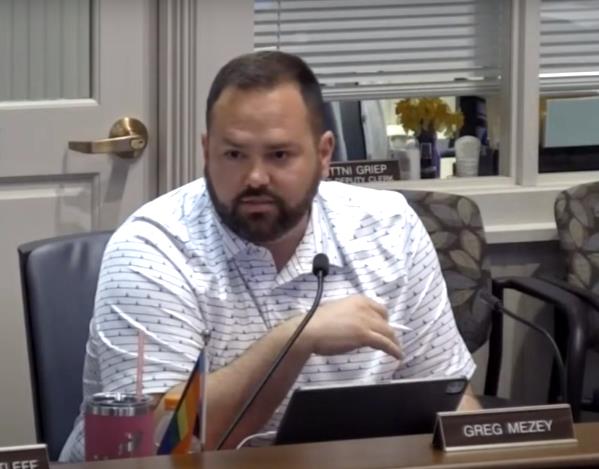
Yet the dividing line between “laser focus” and personal prejudice can prove narrow in local government.
Had William Holtkamp lost his bid for Agricultural District admission, he could still have gone to Ulysses’ Board of Zoning Appeals for a variance to build that proverbial larger barn. He could have continued to enjoy the Agricultural Exemption that reduces his land taxes. And of course, he could still farm. And even within the District, if ever the farmer sold off a piece of his land for a residence, that residence would need to comply with Ulysses’ Conservation Zone rules.
“I think farmland should be protected,” Greg Mezey said. “We have an incredible and increasing food insecurity issue,” he observed. “And to over-zone and overregulate farmland, I think, is to the detriment of our community.”
“I don’t think we need to be as restrictive as we are on potential farmland,” Mezey said. And “I think it’s really important to know and just get out there very clearly that the local elected Town Board does not oppose this being added to the Ag District.”
Democratic legislators Dawson, Travis Brooks, Amanda Champion, and Shawna Black would have amended the Ag District resolution to deny the Ulysses farmer his Agricultural District request. So, too, would have Republican Mike Sigler. Sigler had a different worry. His was that circumventing planning boards could strengthen State Government’s hand in advancing industrial solar installations, a looming interloper to his Town of Lansing.
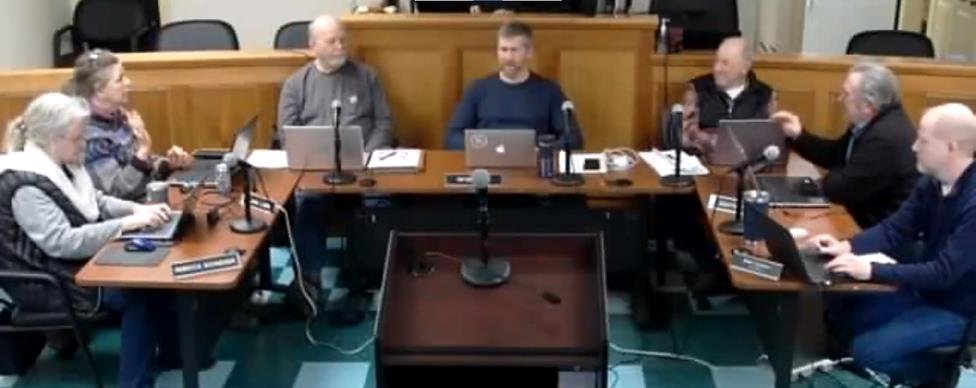
“I don’t want to see the State come in and kind of roll-over local regulators,” Sigler said. “And I would think this would kind of open the door to that.”
But Mike Lane of Dryden would put farmers like Holtkamp in a different category than solar operators. And he would view the Ulysses Planning Board’s excess caution as overblown and unjustified.
“I don’t know of any group that’s more careful about protecting land than our farmers are,” Lane said. “On the whole, they provide the green space that we love about our county.”
“I think if we had a food producer that wanted to come in and generate food and jobs and economic benefit to our community in a responsible way, we should allow that,” Mezey said.
Or mow hay. That’s what’s done every summer at 1618 Route 89.
###

